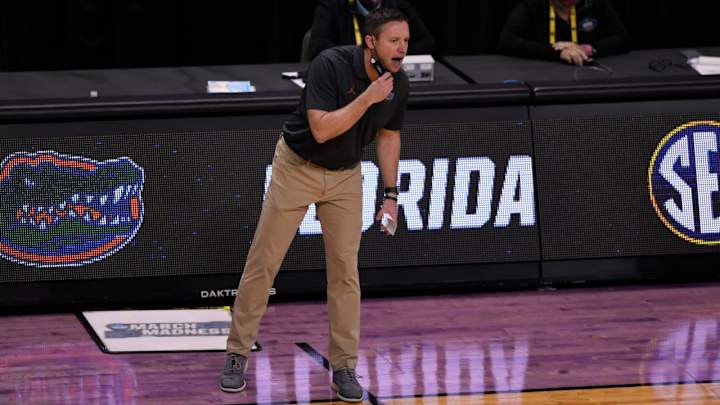Column: The Florida Gators Didn't Play to Win Against Oral Roberts

The Florida Gators tournament run has officially ended at the hands of the 15th-seeded Oral Roberts Golden Eagles.
Despite coming into the matchup as nine-point favorites against the critically undersized Oral Roberts squad, Florida was booted from the field by way of an 81 to 78 loss to one of the unexpected victors in the first round of the NCAA tournament.
Coming off a victory in which the Gators similarly failed to keep a late lead, UF's keys to victory were to control the Golden Eagles in the paint and on the boards given the lack of size the ORU unit possesses.
Shooting a combined 55.2 percent from the floor and winning the rebound battle by 13, the Gators would execute that gameplan but struggled to take care of the basketball. Previously touted a the reason they would see face their exit in March, Florida turned the rock over a total of 20 times.
Playing sloppy from the jump, the Gators would gift the high-octane Oral Roberts offense — that averages 81 points and 11 three-pointers made per game and contains the nations leading scorer — more opportunities to find a rhythm.
However, the turnovers were not the sole reason Florida’s tumultuous season came to an end. In fact, there was an opportunity to overcome their turnover woes during a scoring frenzy in the middle of the second half, when Tre Mann was proving to be the best player on the court.
Instead, the glaring inefficiency that has plagued Florida on numerous occasions in the past is poor strategy. To put it in simpler terms, this loss lies on the shoulders of Gators head coach Mike White.
The unit's unfixable blunders began to accrue when White flipped the switch from running the floor with his highly athletic squad into a slow-tempo half-court offensive attack.
The conservative efforts in the second half allowed Oral Roberts to gain the momentum needed to formulate a comeback, one that would ultimately take down the Gators in a game they had no business losing. Scoring for the last time with 2:30 remaining, the lack of killer instinct to finish off opponents was evident in their loss.
This marks a serious question about the closing sequence of the contest: Has the lesson not been learned about playing conservative with the lead with plenty of time remaining? On multiple occasions over the past few years in the sports world, especially in football and basketball, those who ease up to play in a fashion that is not to lose the game end up falling in defeat.
As Herb Edwards once said: “You play to win the game.”
Instead, Florida played not to lose the game, a game plan that has rarely worked in the modern era of high-octane offensive attacks across the landscape of sports in general. And has before bit the Gators in the butt.
In comparison, in 2019, the Florida Gators held a halftime lead over the seventh-ranked Kentucky Wildcats at home.
Getting out to an 11-point lead on the Wildcats in the second half, Florida began to ease up on John Calipari’s squad with the end goal being not to let the lead slip away.
However, now-NBA players Tyler Herro and PJ Washington orchestrated a comeback against the Gators, with Herro tallying 19 points on 75 percent from the floor.
Winning the game by as much as they were down by (11) in the end, the Wildcats proved to Florida that holding a lead with more than ten minutes remaining on the game clock takes aggression and killer instinct to finish off the opponents.
Similarly, last night, Max Abmas and Kevin Obanor led a comeback of the ages to earn their second upset of the tournament and continue their Cinderella story of a March Madness run.
Not to discredit them, but the difference in relative talent gap between the 2019 Kentucky team — that now has four players in the NBA — and a Summit League squad from Tulsa, Okla., is remarkably large in comparison.
These two occurrences were not the only example of this either. It is a reoccurring error.
The same story has been written many times, yet the same mistake continues to be made. The performance of Florida on Sunday fits a predictable mold of the White era in Gainesville.
Lacking the ability to adapt and improve from failures, in an effort not to repeat their blunders, the Gators are seemingly in a never-ending cycle of mediocrity that won’t end as long as the program fails to make needed changes at the top.
This is not to say the Gators didn’t struggle mightily in some aspects of the contest, in a fashion that White has little control at this point in the season. Or that the way the team has rallied to be in this position following the unfortunate events of Keyontae Johnson has not been impressive.
However, the decisions down the stretch to emphasize defense instead of continuing to win on the offensive end ultimately led to the Gators monumental falling apart in the round of 32, allowing another Sweet 16 appearance to slip through their grasps.
The program has been on a downward trend for years, and — despite a tournament victory against Virginia Tech — it feels as if this final straw for a much-maligned era of Florida Gators basketball.
At the very least, a hard look at the future of the program trajectory with the current regime is necessary.

Brandon Carroll is a recent graduate of the University of Florida. He serves as the lead reporter for the Florida Gators FanNation-Sports Illustrated website, covering football, basketball and recruiting. When he isn't hard at work, he enjoys listening to music, playing flag football and basketball, spending time with his friends and family, and watching an array of television shows. Follow him on Twitter @itsbcarroll.
Follow itsbcarroll